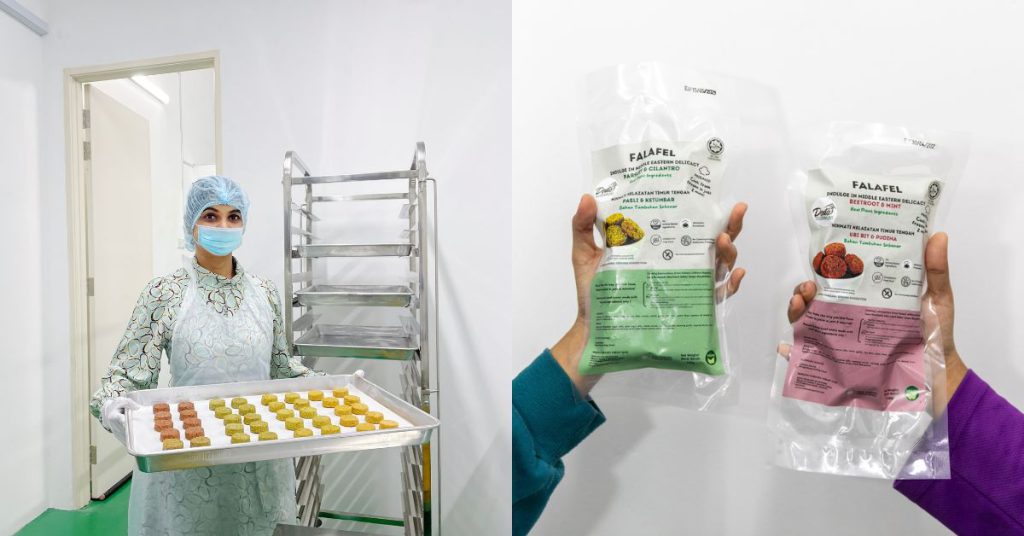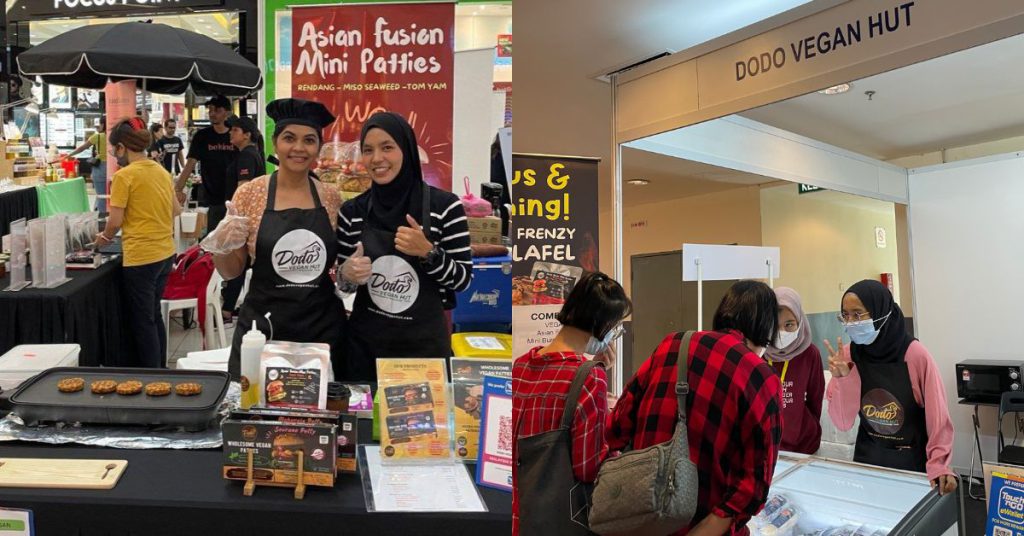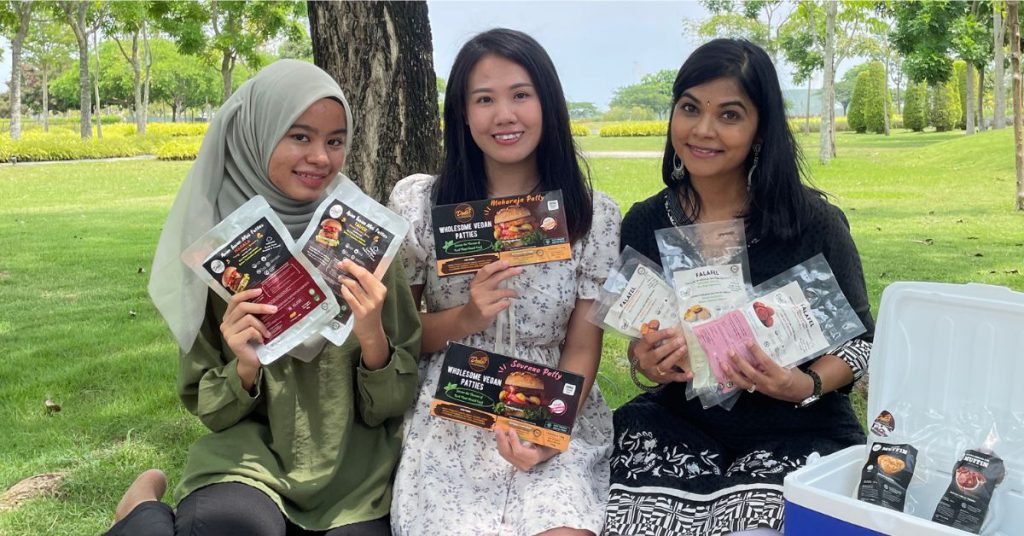Manimegalai Parry, the founder of Dodo Vegan Hut, wasn’t always destined for the world of plant-based convenience food.
“I began my career as a lecturer at Sunway College while pursuing my postgraduate studies back in 2002. Meeting my life partner, a Penangite, made me move to Penang in 2005, and I joined Motorola Technology as a software quality engineer. That was when and how my engineering and corporate career began,” said Manimegalai.
A former engineering whiz with a successful corporate career, Manimegalai’s life took an unexpected turn when a chronic arm injury forced her to reevaluate her priorities.
“I tried to continue working with the injury for about two years but when I could not seek treatment during the pandemic and when the pain started affecting me emotionally, I decided to prioritise my health over money and career.”
“It was one of the toughest decisions that I had to make back then,” she told Vulcan Post.
It was during this period of recovery, struggling to cook healthy meals for her family, that Manimegalai noticed a gap in the market.
Supermarkets were overflowing with unhealthy frozen meals, and there weren’t any local alternatives that offered both convenience and nutrition.
Fueled by her engineering background and a desire to help others facing similar challenges, Manimegalai embarked on a journey of discovery.
From kitchen counter to quality-conscious production
It all started in Manimegalai’s own kitchen. She devoured informative resources such as publications and videos from lifestyle health practitioners from the USA, experimented with recipes, and constantly sought feedback from her family.
“I started experimenting by making some simple healthy foods and storing them in the freezer. And when I received feedback from my family, I improved them,” she shared.

Finally, in late 2021, she felt confident enough to take the leap and commercialise her creations.
But Manimegalai wasn’t about to wing it.
Recognising the importance of quality and safety, she enlisted the help of Dr Cheng Lai Hoong, a food technology expert.
“The quality engineer in me triggered me to do it right the first time by engaging an expert in the field for guidance. I needed a food expert to advise me on how to turn my idea into a food product,” she said.
Together, they meticulously crafted wholesome, plant-based frozen meals made with ingredients like legumes, root vegetables, and whole grains.
“People must understand that freezing is a natural way of preserving products and therefore not all frozen products are harmful,” she added.
Notably, they avoided the common pitfalls of frozen food—no ultra-processed ingredients, artificial flavours, or unnecessary chemicals find their way into Dodo Vegan Hut products.

Although other vegan frozen food brands such as Harvest, Everbest, and Pacific Greens exist in the market, Manimegalai said, “These brands do not offer whole-food plant-based products but rather focus on mock meat or faux meat in the form of burgers and nuggets”.
Halal certification: A gateway to new markets
Manimegalai’s vision extended beyond convenience. She wanted to create a brand that resonated with health-conscious and busy Malaysians.
This is where the company’s halal certification comes in. While Dodo Vegan Hut’s products are inherently plant-based, obtaining halal certification became a strategic move.
The JAKIM halal standard, known for its stringent regulations, not only covers food safety and quality but also adheres to religious principles.
“We also comply with the halal religious aspect, where we use halal certified water filter which contains no animal bones and halal certified natural rice vinegar with no alcohol traces,” said the founder.

This certification opened doors to new markets, particularly hospitals, hypermarkets, and corporate sectors that prioritise halal-certified products.
Additionally, with the Malaysian External Trade Development Corporation (MATRADE) as a partner, Dodo Vegan Hut set its sights on the international halal market, particularly in countries where halal certification is a prerequisite.
From humble beginnings to global aspirations
Dodo Vegan Hut’s journey has been remarkable. From Manimegalai’s home kitchen to a state-of-the-art production facility in Simpang Ampat, Penang, the brand has grown by leaps and bounds.
The company’s initial offerings included wholesome vegan patties, catering to busy families who craved a quick and nutritious meal option has blossomed into a diverse range of products.
Since then, their product line has expanded to include Asian fusion cutlets, falafels, and even fruit muffins, catering to a variety of dietary needs and taste preferences.
Beyond retail, Dodo Vegan Hut offers a selection of rolls, wedges, burger buns, and bagels specifically designed for the F&B industry.

Her commitment to innovation doesn’t stop there. She is actively researching and developing shelf-stable, ready-to-eat plant-based food products, further expanding their reach and convenience factor.
They minimally process and naturally preserve all their products, ensuring the goodness of the plant-based ingredients shines through.
Manimegalai said, “We safely make, pack, and store the products at -18 degrees Celsius. We also pre-bake most of our products for customers’ convenience. Even our falafels are pre-baked because we avoid frying.”
Dodo Vegan Hut currently operates in both B2B and B2C spaces.
They supply their products to retailers and F&B businesses, while also running their own online store and leveraging platforms like Shopee for direct consumer sales.
“We have 13 stock-keeping-units (SKUs) for retail and a total of 28 SKUs for F&B supplies,” she said.
They’re currently focusing on building brand awareness organically through social media campaigns, but future plans include TV advertisements and strategically chosen supermarket placements.
The road ahead
Looking ahead, Manimegalai is passionate about expanding Dodo Vegan Hut’s reach.
They’re export-ready with the help of a government grant, and through actively participating in trade shows like the Malaysian International Halal Showcase (MIHAS) to connect with international buyers.
Additionally, they’re exploring opportunities to partner with F&B franchises and chains, hotels, and airlines, aiming to make healthy plant-based options readily available everywhere.
But Dodo Vegan Hut is more than just a business; it’s also a mission-driven company.

Their all-women team is a testament to their commitment to gender equality, and their focus on plant-based products aligns perfectly with several Sustainable Development Goals, including Zero Hunger, Good Health and Well-being, and Climate Action.
Dodo Vegan Hut’s journey is an inspiring example of resilience, innovation, and a genuine desire to make a positive impact.
From overcoming a personal challenge to creating a brand that empowers healthy eating, Manimegalai and her team are on a mission to revolutionise the way Malaysians think about frozen food.
- You can learn more about Dodo Vegan Hut here.
- Read other articles we’ve written about Malaysian startups here.
Featured Image Credit: Dodo Vegan Hut










